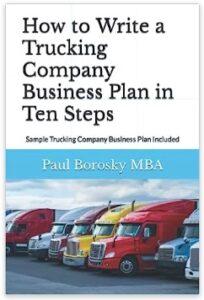How to Write a Box Truck Business Plan or Template
Crafting an effective box truck business plan or template requires a deep understanding of the industry's growth drivers and the implementation of valuable tips and tricks. The box truck sector has grown significantly in recent years, leading to a surge in demand for comprehensive business plans, templates, and financial projections.
A key catalyst behind this growth is the increasing need for skilled truck drivers, particularly in the box truck segment. As the industry seeks a steady supply of capable drivers, more individuals are entering the market. Moreover, many over-the-road truckers, desiring a better work-life balance, are transitioning to box truck driving due to shorter routes and increased time spent with loved ones. These factors have fueled the industry's expansion. Entrepreneurs are strongly encouraged to maintain an updated box truck business plan to thrive in this evolving landscape. This plan serves as a vital roadmap, facilitating effective decision-making and ensuring preparedness for success. Our box truck business plan writer offers invaluable insights, including market analysis, operational strategies, marketing and sales approaches, and financial projections.
Crucial plan components encompass comprehensive market trends analysis, targeted market segmentation, thorough competitive assessments, optimal pricing strategies, efficient operational logistics, and accurate financial forecasting. By integrating these elements, entrepreneurs can construct a robust business case that showcases their profound understanding of the box truck industry.
A well-structured and meticulously crafted box truck business plan enhances your venture's credibility. It bolsters its ability to secure funding, attract potential partners, and guide its triumphant establishment and expansion in the thriving box truck sector.
CLICK HERE TO CHECK OUT OUR BOX TRUCK BUSINESS PLAN TEMPLATE!!
Executive Summary for a Box Truck Business Plan.

In the executive summary of a box truck business plan, it is essential to provide a concise overview of key elements related to the company's operations. This includes establishing a home office, the core focus of freight transport, advertising strategies, and financial projections. Moreover, highlighting the owner's experience in the trucking industry and their utilization of logistics software for dispatch and freight tracking helps establish their qualifications for starting or expanding operations.
The executive summary should also explicitly state the funding required for initiating or growing the box truck fleet. A brief explanation of the repayment strategy should accompany this specific dollar amount. A common approach involves utilizing business cash flows as a source for repayment. Clearly outlining the funding amount and the proposed repayment strategy succinctly provides a clear understanding to the reader. It effectively communicates the funding needs and the intended approach for fulfilling repayment obligations.
Following this structure, the executive summary concisely and effectively conveys vital information, ensuring the reader understands the funding requirements and repayment plan. The brevity and clarity of the strategy contribute to the effectiveness of the overall business plan, setting a solid foundation for further evaluation and consideration by potential investors or lenders.
Need Help Writing a Box Truck Business Plan?
Call or Text Paul, Doctoral Candidate, MBA.
321-948-9588
CLICK HERE TO CONTACT US TODAY!!!
Company Information and Location
The company information section of a box truck business plan or template encompasses essential details about the company's identity and operations. It should include the company name and, if applicable, the location of the office or headquarters. Additionally, it is crucial to specify the number of box trucks that will be part of the operations.

To provide a comprehensive overview, our box truck business plan writer suggests discussing the geographic area where the company will offer freight transportation services. This allows readers to understand the scope of the business. Some box truck companies specialize in local deliveries, serving a specific city or region. In contrast, others may extend their services to cover larger areas, including regional or long-distance freight transportation.
Addressing the service area within the company information section clarifies the business's operational reach. It lets readers grasp the box truck company's geographic focus and potential target market. Whether it's local, regional, or long-distance transportation services, defining the service area helps outline the company's operational strategy and sets expectations for potential clients and partners.
Service Description and Competitive Advantages
When describing the services and competitive advantages in a box truck business plan template or business plan, it is essential to identify the specific competitive advantages that align with the organization. Begin by brainstorming the unique strengths and differentiating factors of the business. For instance, some box truck companies specialize in niche services such as transporting temperature-sensitive goods or offering dedicated routes for specific industries. Others may focus on hiring highly skilled and experienced drivers.
In the competitive advantage section, it is advisable to highlight only two or three key advantages to maintain focus and avoid overwhelming the reader. More detailed information on these selected advantages ensures a balanced presentation about other business plan sections.
The business plan effectively communicates its unique value proposition to potential investors, partners, and clients by focusing on the organization's competitive advantages. These advantages showcase the company's ability to meet specific customer needs, provide specialized services, or leverage expertise in a particular niche. Emphasizing these differentiators sets the business apart from competitors and positions it as a preferred choice within the box truck industry.
Target Market for a Box Truck Business Plan or Template
The target market for a box truck business plan or template is typically determined based on the specific goods or freight being transported. A generalist box truck company may target small to midsize manufacturers needing regional freight delivery services. On the other hand, a specialist box truck operator focusing on refrigerator transportation may cater to food wholesalers requiring regional deliveries. To accurately define the target market segments in the business plan, it is crucial to document and understand the services and freight offerings thoroughly. The target market can be easily identified and aligned by understanding the business's capabilities and specialization.
To effectively identify the target market segments, consider factors such as the nature of the goods, geographical coverage, industry requirements, and customer preferences. This information will help pinpoint the customer groups or industries most likely to benefit from and utilize the box truck services offered.
Industry Research for a Box Truck Business Plan

When conducting industry research for a box truck business plan, it is essential to tailor the focus based on the intended use of the box trucks. The research should center around local freight-hauling statistics if the organization's primary operations involve local deliveries.
A practical approach to industry research in this context would involve examining critical metrics related to local freight trucking. For instance, analyzing the revenue generated by local deliveries in the past 12 months, which amounted to approximately $63 billion, provides valuable insights into the market's size and potential. Additionally, understanding the profit margins for local freight trucking companies is crucial, with average profit margins of around 6.7% compared to long-distance operations.
Another valuable aspect of industry research is understanding the competitive landscape. It is worth noting that over 265,000 local freight trucking companies operate throughout the United States. This information provides insights into the industry's competition level and highlights the need for effective differentiation strategies.
Owner and Management Section
In the owner and management section of the box truck business plan or template, it is essential to highlight the owner's experience in the truck driving industry. This includes detailing their training, certifications, and hands-on work experience operating box trucks. By showcasing the owner's extensive experience and expertise in truck driving, particularly in the box truck segment, they establish a solid foundation to justify their role in starting or expanding the business.
Furthermore, discussing relevant educational accomplishments and certifications supporting the owner's management capabilities is valuable. For instance, business degrees, logistics software certifications, or other related qualifications demonstrate the owner's understanding of fundamental business principles and ability to manage and operate a box truck business effectively.
By combining practical experience in truck driving with educational accomplishments, the owner showcases a well-rounded skill set necessary for successfully managing and operating a box truck business. This business plan section highlights the owner's qualifications, expertise, and dedication, instilling confidence in potential investors, partners, and lenders.
Funding Request for a Box Truck Business Plan
In the funding request section of a box truck business plan, it is crucial to provide a clear and explicit statement of the dollar amount needed to start or expand the box trucking operations. This amount should reflect a comprehensive assessment of the financial requirements for the business.
It is essential to break down the specific categories for allocating funds to substantiate the funding request further. This may include purchasing box trucks, acquiring additional equipment such as liftgates, procuring essential hand tools for maintenance, and allocating working capital to ensure the business's financial stability during the initial months of operation. By categorizing the funding needs, it provides a transparent breakdown of how the requested funds will be utilized.
The structure of the funding request offers both specificity and flexibility. It identifies the total amount required for the business while allowing for adaptability in allocating funds within the identified categories. This approach demonstrates prudent planning and strategic decision-making essential to securing funding from potential investors or lenders.
Financials and Financial Projections for a Box Truck Business Plan
When developing the financials and projections for a box truck business plan, it is essential to consider various factors. First, determine the average daily miles the box truck will drive, typically 200 to 500. Next, establish the expected per-mile rate that will be charged to customers. Additionally, determine the number of operating days for the box truck.
To calculate the daily revenues, multiply the average miles driven by the per-mile rate charge. If applicable, consider including delivery fees by estimating the number of deliveries and calculating the average delivery price. After determining the revenues, it is essential to identify fixed and variable costs associated with operating the box truck business. Fixed costs may include insurance, licenses, and lease expenses, while variable costs could include fuel, maintenance, and toll fees. Subtracting these costs from the revenues will provide the net profit or loss.
To create a robust financial model, allow for flexibility in adjusting variables such as revenue growth rates, expenses, and other factors that may impact the financial performance of the box truck business. Utilize growth rates to forecast the financial projections for the upcoming 12 months and extend them to cover five years.
Hopefully, these insightful tips and tricks for writing a business plan were helpful. Email or call us for help with a business plan or financial projections.
Author: Paul Borosky, Doctoral Candidate, MBA., Author
Owner of: Quality Business Plan and Quality Business Consultant.
Date: 9/19/2023